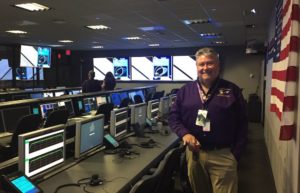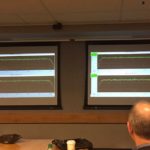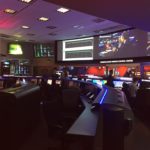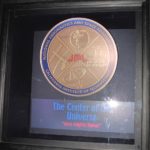In Roman mythology, Saturn, king of the Titans, feared he would be overthrown by one of his children and so ate five of six upon their births. At 4:55 am this morning, we witnessed the first bite as Cassini flew into the gas giant at 75,000 mph, vaporizing in its atmosphere. How honored I was to be present for such a celebratory ending to a nearly 20-year epic endeavor.
 Behind me is Mission Control where the Cassini family (including my good friend Bill Knopf who was kind enough to invite me to the Grand Finale) wore matching purple shirts and ate lucky peanuts. Although we all nervously awaited the actual demise of the spacecraft, it had already happened–the radio signal coming out of Cassini takes 83 minutes to travel 746 million miles at the speed of light from Saturn to Earth. The final loss of signal was registered on a server in the basement of JPL where all information from the Deep Space Network is processed, informally known as “the center of the universe.”
Behind me is Mission Control where the Cassini family (including my good friend Bill Knopf who was kind enough to invite me to the Grand Finale) wore matching purple shirts and ate lucky peanuts. Although we all nervously awaited the actual demise of the spacecraft, it had already happened–the radio signal coming out of Cassini takes 83 minutes to travel 746 million miles at the speed of light from Saturn to Earth. The final loss of signal was registered on a server in the basement of JPL where all information from the Deep Space Network is processed, informally known as “the center of the universe.”
Needless to say, the mood was bittersweet, and in the final 45 seconds after the signal was lost and Cassini itself was becoming part of Saturn, I found myself moved to tears knowing that many of the people in the room with me had spent their entire careers on the mission. This apotheosis of sorts is opposite of the usual fare at JPL where people flock to Pasadena/La Cañada-Flintridge to watch mankind defy gravity, not throw themselves into it.

Today Saturn may have eaten his first son, but his wife Ops has a trick up her sleeve… she’s hidden her sixth child, Jupiter, on the island of Crete, and one day Jupiter will overthrow Saturn to become god of the gods. Who knows? One day NASA might overthrow the limitations of biology and bring us to new worlds where life thrives. The science collected by Cassini will direct those future missions, particularly for Saturn’s moon, Enceladus. With its subsurface global ocean and high concentrations of hydrogen, the growing body of evidence points to the moon’s habitability. We may not be alone. As the great Carl Sagan said, “If it’s just us, seems like an awful waste of space.” That is the audacity of curiosity, the unrelenting progress of time, the triumphant fate for those who “dare mighty things.” #ReachForTheStars




